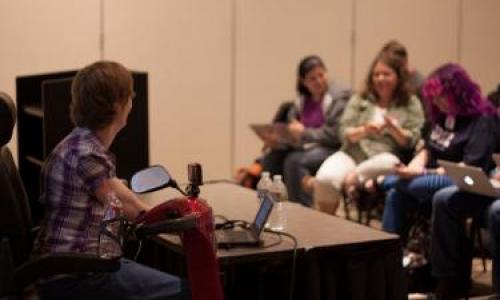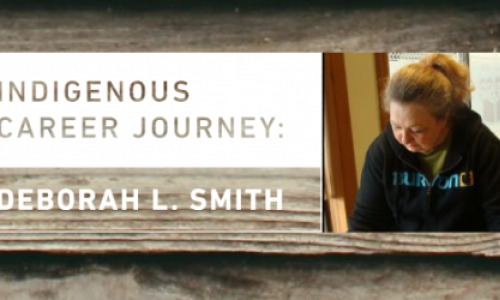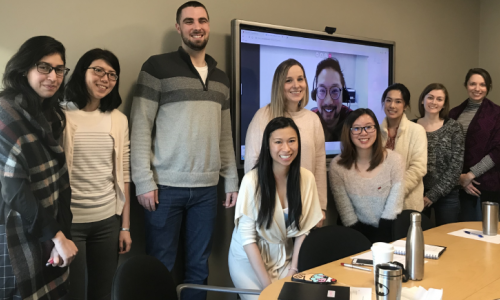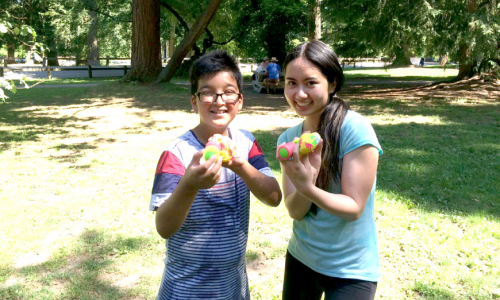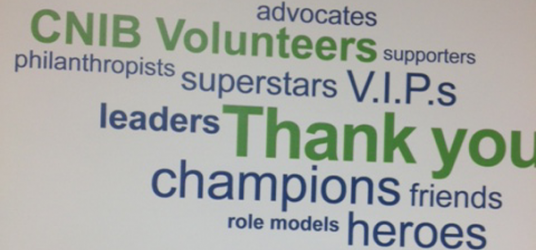
Retinitis pigmentosa – I never heard of this term until I got diagnosed with it about four years ago. After a series of not-very-fun tests, an eye specialist told me that I indeed had this genetic disease. It is currently incurable, however there is a lot of research going on and a large community of people with low vision who is hoping that a cure will be discovered sooner rather than later. The day I became a member of this community, I discovered a whole other world. Literally, even though I technically see less, I can see so much more about the lives of people with vision loss and the challenges they conquer on a daily basis.
After a few months of living with this information on my own, which was quite a scary experience, my eye specialist referred me to CNIB (Canadian National Institute For The Blind) where I could attend a support group and connect with other people who have vision loss. I was really looking forward to attending the group meetings as I find real value in connecting with others going through a similar experience. I was even more excited when I discovered that Quyn Le – an extremely inspirational woman whom I saw speaking at TEDxSFU a few years back – was leading the group at that time. Quyn was an important role model for me as she was one of the very few people I knew at that time who was blind but who still manages to have a great career and live up to their potential. The support group gave me another gift as I met a wonderful friend there who shares my diagnosis and has similar interests. Chatting with her about our fears and joys is truly priceless.
During the session I attended with Quyn, I met people who could see a lot less than me and yet continued to do amazing things in their lives, stepping out of their comfort zones daily. I also learnt a lot about myself because after the many questions I asked, Quyn said she could see me be an activist – there is a lot I see that can be done and a lot I would like to do to help shed light on life with vision loss. For some, this life can be seen as full of challenges but after a few years, I began to focus on the opportunities to help me accept the situation.
I started volunteering with CNIB last year and I am helping organize their first Transition Support Group for Young Adults with Vision Loss which is incredibly rewarding. A group of young adults will be able to learn more about each other’s experiences, educational opportunities, scholarships, work opportunities, and set goals for themselves so that they can all live full lives and live up to their potential. Trust me, the fear of not being able to be independent, go to school, and have a career you love can be quite overwhelming when you live with vision loss.
I am really happy that I have the opportunity to offer my time and skills to this important cause and there are many other opportunities for getting involved at CNIB. If you want to get involved and support those living with vision loss in your community, please read on for the answers to a few questions I posed to Jaishree, the Volunteer Coordinator, about upcoming volunteer opportunities.
Are there any opportunities for students to get involved with CNIB?
Yes, students, as long as they’re 18 or older can get involved with CNIB. We have various volunteer opportunities available, but our most popular is the Vision Mate program. It is a community-based role where a volunteer is matched with someone in their community who has vision loss and they can help that person for 2 hours/week with activities such as reading, organizing, accompany on walks/errands, or social visiting. It’s especially popular with students because scheduling is flexible – the volunteer and client determine whatever mutual times work best for them.
What are the benefits of volunteering at CNIB?
Volunteering at CNIB allows individuals to make a difference for people who are blind or partially sighted, as a lot of our volunteers work directly with clients. It’s also a wonderful way to develop new skills and share the skills volunteers already have in new, innovative ways. Last but definitely not least, volunteering allows individuals to build relationships with staff, clients and other volunteers and work together collaboratively to help CNIB achieve its mission.
How can I support someone with low vision if I see them in public?
If you see someone with low vision in public and you think they may need assistance, the best thing to do is approach them in a friendly manner and ask if they need help. Don’t assume you know what they need.








